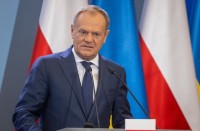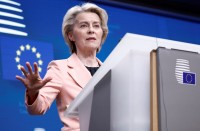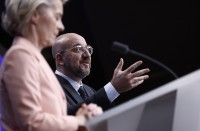ABOARD the GIUSEPPE GARIBALDI aircraft carrier, Italy (AFP) – by Hervé ASQUIN Ella IDE
The leaders of France, Germany and Italy insisted Monday that Britain’s decision to quit the European Union would not kill the bloc.
Speaking aboard an aircraft carrier anchored off the Italian island of Ventotene, one of the cradles of the dream of a united, integrated Europe, the leaders vowed to relaunch the European project in the wake of the Brexit shock.
“Many thought the EU was finished after Brexit but that is not how it is,” Italian Prime Minister Matteo Renzi said.
“We want to write a better page (in European history).
“It is easy to complain and find scapegoats and Europe is the perfect scapegoat. But it is also about peace, prosperity and freedom.”
French President Francois Hollande said Europe was faced with a risk of “fragmentation and division” and needed a “new impulse” on three fronts: the economy, defence and security, including ensuring jobs and education opportunities for young people.
German Chancellor Angela Merkel recalled that the EU had been born from some of the “darkest moments” of European history and stressed the need to deliver “growth to ensure people have jobs and hope in the future.”
The three leaders were speaking ahead of a working dinner aboard the Italian navy’s Guiseppe Garibaldi aircraft carrier.
Renzi called the meeting in a bid to forge a common position on the way forward ahead of a summit of the 27 remaining EU states in Bratislava next month.
Europe’s economic outlook, jihadist attacks, the refugee and migrant drama, the Syrian conflict, and relations with Russia and Turkey were also expected to be covered.
The Brexit vote has raised fears of similar referendums in other countries, particularly the Netherlands, which opposes changes to the EU to achieve closer integration.
Coming up with a road map acceptable to all will not be easy, with the Czech Republic, Hungary, Poland and Slovakia vowing after Britain’s vote to draw up their own plans for a less centralised EU.
Renzi had earlier taken his guests to the grave of Altiero Spinelli, one of the founding fathers of the ideal of European integration.
Imprisoned on the island by the fascist government during World War II, Spinelli and fellow captive Ernesto Rossi co-wrote the “Ventotene manifesto” calling for a federation of European states.
Defence, economy, culture
The choice of the Garibaldi for the working dinner and press conference was also highly symbolic. The carrier is the flagship of the EU’s “Sophia” mission against people trafficking in the Mediterranean.
The Ventotene trip was the start of an intensive tour for Merkel as she attempts to coordinate a response to one of the EU’s biggest crises in decades and quell fears Berlin wants to monopolise the debate.
After a series of deadly attacks by the Islamic State group, the three leaders were also expected to explore greater co-operation on counter-terrorism and an integrated European security and defence policy — a long-cherished objective that could be easier to achieve after sceptical Britain departs.
In terms of the economy, Hollande wants an EU investment fund for infrastructure, education, research and innovation to be doubled, according to a French diplomatic source.
Renzi is campaigning for greater flexibility on EU deficit rules to help his flagging economy. “We need strong measures to relaunch growth and fight youth unemployment,” he said.
All three leaders have been hit in the polls by varying toxic combinations of refugee crisis, economic slump and terror attacks, with eurosceptic or populist parties gaining ground.
And with 2017 bringing a general election in Germany and a presidential election in France, they will be wary of ignoring opposition to further European integration at home, leaving them little room for manoeuvre.







